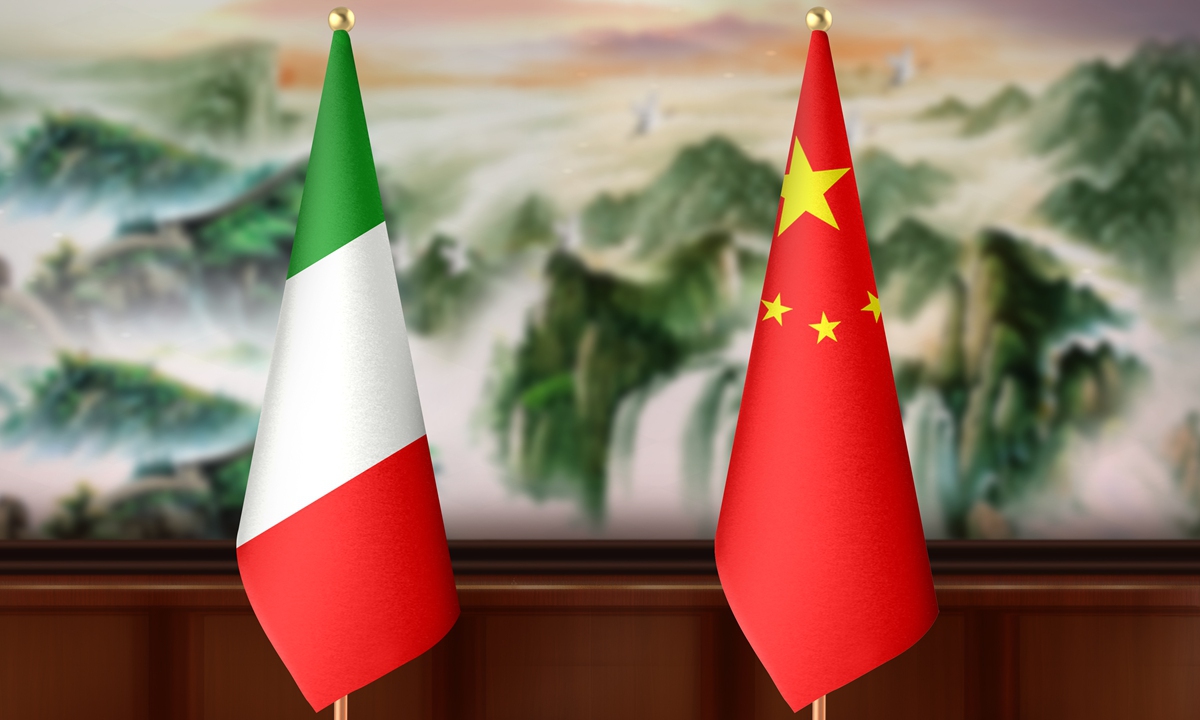
China Italy Photo: VCG
Italian Prime Minister Giorgia Meloni is wrapping up her five-day visit to China. The tour comes on the occasion of the 20th anniversary of the establishment of the China-Italy comprehensive strategic partnership. During her stay in Beijing, the two countries signed several bilateral cooperation documents and jointly issued a three-year action plan to strengthen the bilateral comprehensive strategic partnership. Meloni said her trip was a "demonstration of the will to begin a new phase, to relaunch our bilateral cooperation."
It's worth noting that under Meloni's leadership, the Italian government previously decided to withdraw from the China-proposed Belt and Road Initiative (BRI) and has actively demonstrated a tough stance on China. Additionally, Italy is one of the countries that support the EU's imposition of tariffs on Chinese electric vehicles. Thus, the following questions must be asked: What signals does Meloni hope to convey through this visit? Can China-Italy relations achieve stable and long-term development in the future?
The purpose of Meloni's China visit is clear: to repair the rift in China-Italy relations. The Meloni government's withdrawal from the BRI was often interpreted as the new Italian government's foreign policy shift toward a "pro-US and anti-China" attitude. Therefore, the Italian side is concerned that China-Italy relations could be strained and destabilized. In this context, Meloni's primary task during this visit is to explain Italy's "difficulties" to China. She hopes to gain China's understanding so that both countries can maintain a good relationship even without renewing the agreement.
Enhancing China-Italy economic and trade relations has been a top priority for Meloni's visit. Although the Meloni government has shown an unusual degree of stability in Italian politics since taking office, and the first quarter of 2024 saw slight growth in Italy's GDP, the country's public debt remains high, the business confidence index has declined for three consecutive months, and economic sluggishness continues to be a major concern for the public. Thus, leveraging good economic and trade relations with China to boost Italy's economy is a key priority for the Meloni administration.
Additionally, demonstrating Italy's "equidistance" between China and the US is also part of Meloni's agenda. Given the competitive situation between China and the US, Italy, as a member of the G7, cannot continue to participate in initiatives like the BRI, which the US views as a Chinese strategy to compete with the US, nor can it completely "alienate the US and embrace China." However, as a typical "middle power," Italy's one-sided alignment with the US does not align with its diplomatic traditions and long-term national interests. Therefore, choosing a "hedging" strategy, hedging its bets by maintaining good relations with both China and the US and engaging in pragmatic cooperation with China in a "depoliticized" environment will be the strategic choice that best serves Italy's interests. Furthermore, the Meloni administration is very clear that China has become an important dialogue partner in solving international problems and easing global tensions.
Finally, although Meloni's visit clearly shows her intention to "play a balancing act," the future of China-Italy relations remains promising. Overall, Meloni's visit carries the good intention of easing China-Italy relations and demonstrates a positive attitude toward seeking cooperation with China. The logic of economic and trade cooperation is stronger than the logic of "de-risking."
Italy is the second-largest manufacturing economy in Europe, the third-largest economy in the Eurozone and China's fourth-largest trading partner in the EU. Meanwhile, China is Italy's largest trading partner in Asia. China-Italy cooperation has potential not only in Europe but also in third-party markets like Africa. In the future, as long as both countries continue to solidify the position of economic and trade relations as the cornerstone of their bilateral relations, enhance the complementarity of their economic and trade relations, explore new paths for cooperation and foster friendships through cultural exchanges, a mature and stable China-Italy relationship is certainly within reach.
The author is research fellow at Center for EU Studies, Shanghai International Studies University. opinion@globaltimes.com.cn




